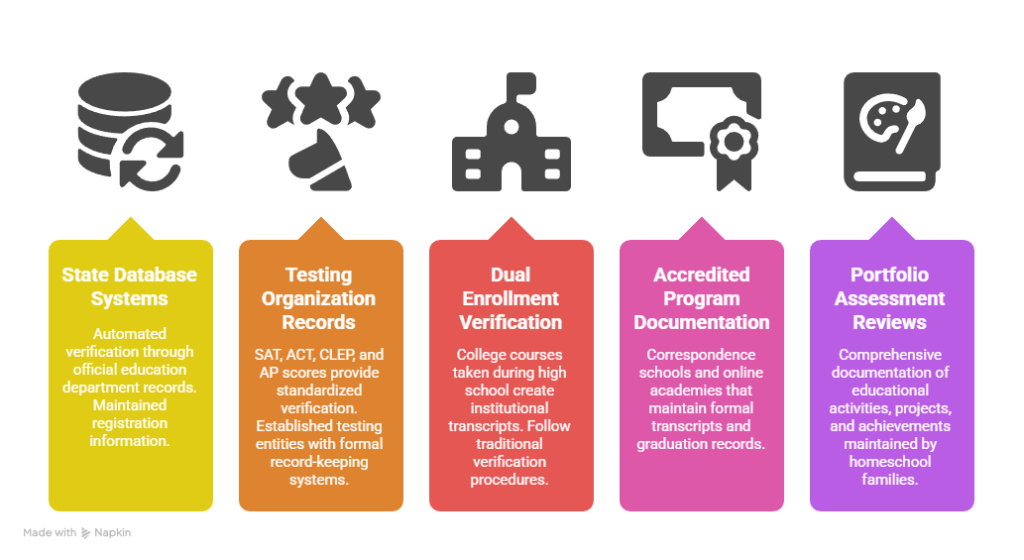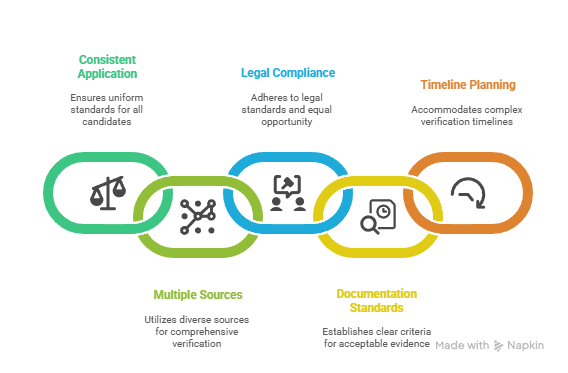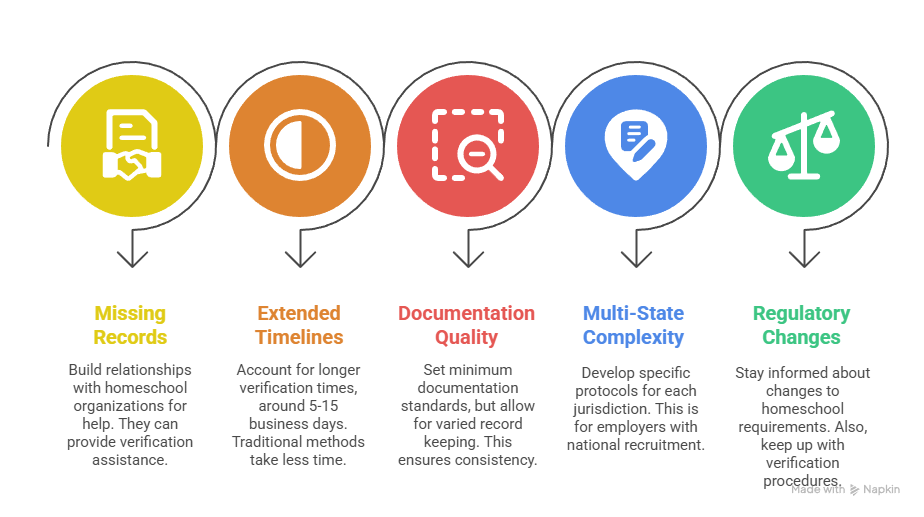Homeschool diploma background checks require specialized verification processes that differ from traditional educational credentials. Employers must adapt their educational background verification procedures to accommodate the growing population of homeschooled candidates entering the workforce while maintaining compliance with employment law requirements.
Key Takeaways
- Homeschool education verification requires different approaches than traditional diploma checks since homeschooled students may not have institutional records or standardized transcripts.
- Employers can verify homeschool credentials through state education departments, testing organizations, and direct communication with homeschool families or oversight programs.
- Alternative education background screening must comply with FCRA regulations and equal employment opportunity laws while avoiding discrimination against non-traditional educational paths.
- Documentation for homeschool graduates may include portfolios, standardized test scores, dual enrollment transcripts, or certificates from accredited homeschool programs.
- Employers should focus on skills assessment and relevant qualifications rather than solely relying on traditional diploma verification for homeschooled candidates.
- Legal compliance requires consistent application of educational verification policies across all candidates, regardless of their educational background type.
Understanding Homeschool Education in the Modern Workforce
The landscape of American education has evolved significantly over the past two decades. According to the National Center for Education Statistics, approximately 2.6 million students were homeschooled in 2019. This represents a 300% increase since 1999. This dramatic growth means employers across industries now encounter job candidates with homeschool diploma background check requirements more frequently than ever before.
Homeschooling operates under different regulatory frameworks depending on the state. This creates variation in documentation and verification processes. Unlike traditional high schools that maintain centralized records and issue standardized diplomas, homeschool education often involves individualized curricula and diverse assessment methods. This educational approach can produce highly capable graduates. However, it requires employers to adapt their screening procedures accordingly. The COVID-19 pandemic accelerated homeschool adoption significantly. Many families continued this educational path even after schools reopened. As these students reach employment age, hiring professionals must understand how to effectively conduct educational background verification while maintaining fair and legal hiring practices throughout the process.
Legal Framework for Educational Background Verification
When conducting any background check, including homeschool diploma verification, employers must comply with the Fair Credit Reporting Act (FCRA). This federal law governs how consumer reporting agencies collect and use background information. Under FCRA guidelines, employers must obtain written consent before conducting educational background checks and provide adverse action notices if educational credentials influence hiring decisions.
| Legal Requirement | Application to Homeschool Verification |
| FCRA Consent | Required for all educational background checks regardless of school type |
| Equal Treatment | Same verification standards must apply to all candidates |
| Adverse Action Notices | Must be provided if homeschool credentials affect hiring decisions |
| Documentation | Verification procedures must be consistently documented |
Non-traditional diploma verification falls under the same legal requirements as conventional education screening. Employers cannot apply different standards solely because a candidate was homeschooled as this could constitute discriminatory practices under employment law.
State Regulations and Documentation Variations
Each state maintains different homeschool oversight requirements that significantly affect available verification methods. States with high regulation typically maintain detailed records and issue official certificates. States with minimal oversight rely primarily on family-maintained documentation.
- High Regulation States: New York, Pennsylvania, Vermont - offer state-maintained records and required testing documentation
- Moderate Regulation States: Florida, Georgia, North Dakota - provide some state oversight with varied documentation options
- Low Regulation States: Texas, Oklahoma, Illinois - maintain minimal state involvement with family-controlled record-keeping
Understanding your state's homeschool regulations helps employers identify appropriate verification channels. This knowledge enables more effective and legally compliant screening processes across different jurisdictions.
Regional Compliance Differences
The Northeast region typically requires more formal homeschool oversight and documentation. States like New York mandate detailed quarterly reports and annual assessments. The South and West generally allow more family autonomy in educational decisions and record-keeping. These regional differences create challenges for multi-state employers who must understand varying requirements.
Interstate Verification Challenges
Families who move between states during homeschooling create additional verification complexity. Different state requirements mean documentation may be incomplete or inconsistent across jurisdictions. Employers should develop flexible verification approaches that accommodate interstate educational histories.
| Challenge | Solution | Implementation |
| Missing State Records | Multiple verification sources | Contact previous states and testing organizations |
| Inconsistent Documentation | Portfolio review process | Establish standardized evaluation criteria |
| Regulatory Variations | State-specific protocols | Develop jurisdiction-appropriate procedures |
This comprehensive approach ensures fair evaluation while maintaining verification thoroughness. Multi-state verification requires additional time but provides a more complete candidate assessment.
Verification Methods for Homeschool Credentials
Many state education departments maintain databases or verification systems for homeschool students. These resources vary by jurisdiction but may include registration records, testing results, or completion certificates. Contacting the relevant state education department provides a starting point for homeschool transcript validation when traditional institutional verification is unavailable.

- State Database Systems: Automated verification through official education department records and maintained registration information
- Testing Organization Records: SAT, ACT, CLEP, and AP scores provide standardized verification through established testing entities with formal record-keeping systems
- Dual Enrollment Verification: College courses taken during high school create institutional transcripts that follow traditional verification procedures
- Accredited Program Documentation: Correspondence schools and online academies that maintain formal transcripts and graduation records
- Portfolio Assessment Reviews: Comprehensive documentation of educational activities, projects, and achievements maintained by homeschool families throughout the educational process
These verification methods provide multiple pathways for confirming educational credentials. Employers should utilize several sources to create comprehensive verification profiles for homeschool candidates.
Digital Verification Platforms
Digital portfolio platforms enable homeschool families to create comprehensive, organized records of educational achievements. These platforms often include templates, assessment tools, and verification features that make documentation more professional and easier to share with employers.
Third-Party Assessment Services
Independent assessment services specialize in evaluating homeschool portfolios and issuing formal transcripts. These organizations apply standardized criteria to diverse educational experiences. They create documentation that more closely resembles traditional school transcripts while maintaining accuracy regarding actual educational content and achievement levels.
Alternative Education Background Screening Best Practices
Effective alternative education background screening requires adapted processes that maintain thoroughness while accommodating non-traditional educational paths. Employers should develop specific protocols for homeschool verification that ensure consistency and legal compliance. These procedures must balance due diligence requirements with practical recognition that homeschool documentation differs from institutional records.

- Consistent Application: Same verification standards for all candidates regardless of educational background
- Multiple Verification Sources: State records, testing organizations, portfolio documentation, and skills assessment
- Legal Compliance: FCRA adherence and equal employment opportunity requirements throughout verification
- Documentation Standards: Clear criteria for acceptable evidence and evaluation procedures
- Timeline Planning: Extended processing time accommodation for complex verification requirements
Successful screening programs focus on competency verification rather than purely procedural compliance. This approach recognizes that homeschool graduates may possess equivalent or superior skills despite following non-traditional educational paths.
Skills-Based Assessment Integration
Modern hiring practices increasingly emphasize skills and competencies over traditional credentials. This trend particularly benefits homeschool graduates who may lack conventional documentation but possess strong job-relevant abilities. Skills-based evaluation methods can complement or partially substitute for traditional educational verification when institutional records are limited.
Training Requirements for Hiring Personnel
Training hiring personnel on homeschool verification procedures ensures consistent application and reduces discriminatory practices. Staff should understand available verification resources, legal compliance requirements, and appropriate evaluation criteria for non-traditional educational backgrounds.
Common Challenges and Practical Solutions
The most significant challenge in homeschool verification is the absence of institutional records that traditional background checks rely upon. Unlike conventional schools with centralized administration and standardized record-keeping, homeschool education involves family-maintained documentation that may not follow institutional formats. This creates verification gaps that require creative and flexible solutions.

- Missing Records: Develop relationships with state homeschool organizations that provide verification assistance
- Extended Timelines: Plan for 5-15 business days versus 2-5 days for traditional verification processes
- Documentation Quality: Establish minimum standards while accommodating diverse record-keeping approaches
- Multi-State Complexity: Create jurisdiction-specific protocols for employers with national recruitment needs
- Regulatory Changes: Maintain current knowledge of evolving state homeschool requirements and verification procedures
Solutions include utilizing standardized testing verification and establishing clear documentation requirements communicated early in hiring processes. Employers benefit from developing contingency procedures when primary verification methods are unavailable.
Technology Solutions and Automation
Digital verification platforms are emerging to address homeschool credential challenges by creating secure, verifiable digital records of educational achievements. These systems store portfolios, test scores, and certifications in standardized formats while enabling easier sharing and verification processes.
Industry-Specific Adaptations
Different industries have varying educational requirements and verification needs that affect homeschool credential acceptance. Healthcare, finance, and education sectors often have strict requirements due to regulatory oversight. Technology and creative fields typically prioritize skills over formal credentials and may find homeschool graduates well-suited due to their self-direction and diverse learning experiences.
Future Trends in Educational Verification
The homeschool movement continues expanding as educational technology improves and families seek personalized learning approaches. Blockchain technology offers potential solutions for secure credential verification by creating tamper-proof records that can be independently verified. Artificial intelligence and machine learning technologies assist with portfolio evaluation and skills assessment through automated analysis.
Digital credentialing systems are becoming more sophisticated and widely adopted across educational sectors. These platforms create standardized documentation formats that bridge gaps between traditional and alternative education verification. Professional certification programs increasingly complement formal education requirements and provide objective skill verification.
The trend toward skills-based hiring continues gaining momentum across industries as employers recognize that competency matters more than educational pathway. This shift particularly benefits homeschool graduates who demonstrate strong self-direction, critical thinking, and practical problem-solving abilities developed through individualized learning experiences.
Conclusion
Homeschool diploma background checks require adapted verification approaches that accommodate the growing population of non-traditionally educated job candidates. Employers must balance thorough screening requirements with recognition that homeschool graduates may possess equivalent qualifications despite different educational documentation. Successful verification strategies combine multiple evidence sources, maintain legal compliance, and emphasize skills-based evaluation methods. As homeschool education continues expanding, employers who develop effective alternative education screening processes will access diverse talent pools while maintaining hiring quality and legal compliance standards.
Frequently Asked Questions
Can employers legally require traditional diploma verification for all positions?
Employers can establish educational requirements for positions, but they must apply verification standards consistently across all candidates regardless of educational background type. Requiring traditional institutional verification only from homeschool candidates while accepting standard documentation from others could constitute discriminatory practices under employment law.
How long does homeschool diploma verification typically take?
Homeschool education verification usually requires 5-15 business days depending on state regulations and documentation availability. Traditional diploma checks often complete within 2-5 days, but homeschool verification may involve multiple sources and custom verification approaches that extend processing times.
What documentation should employers request from homeschool candidates?
Acceptable documentation varies by state but typically includes homeschool diplomas or certificates, transcripts or portfolio records, standardized test scores (SAT/ACT/GED), and any dual enrollment or community college transcripts. Employers should establish consistent documentation requirements that comply with state homeschool regulations.
Are homeschool diplomas legally equivalent to traditional high school diplomas?
In most states, properly issued homeschool diplomas carry legal equivalency to traditional high school diplomas for employment purposes. However, specific recognition requirements vary by jurisdiction, and employers should verify state-specific regulations governing homeschool credential recognition.
How can employers verify homeschool transcripts and grades?
Homeschool transcript verification often involves direct communication with homeschool families, state education department records where available, or review of portfolio documentation. Some states maintain oversight programs that can verify homeschool completion, while others rely primarily on family-maintained records.
What should employers do if homeschool verification is impossible?
When traditional verification methods are unavailable, employers can utilize skills-based assessment, require standardized test scores, accept portfolio documentation, or implement probationary employment periods. The key is maintaining consistent standards that don't discriminate against homeschool candidates while ensuring job qualification requirements are met.
Additional Resources
- Home School Legal Defense Association (HSLDA) - State Homeschool Laws
https://hslda.org/legal - College Board - Homeschooled and Away Students SAT Information
https://satsuite.collegeboard.org/sat-school-day/taking-the-test/homeschooled-away - Federal Trade Commission - Fair Credit Reporting Act (FCRA)
https://www.ftc.gov/legal-library/browse/statutes/fair-credit-reporting-act - SHRM - Education Verification Best Practices
https://www.shrm.org/topics-tools/tools/hr-answers/employer-verify-applicants-education - National Student Clearinghouse - Degree and Enrollment Verification
https://www.studentclearinghouse.org/solutions/business-verifications/

GCheck Editorial Team
Meet the GCheck Editorial Team, your trusted source for insightful and up-to-date information in the world of employment background checks. Committed to delivering the latest trends, best practices, and industry insights, our team is dedicated to keeping you informed.
With a passion for ensuring accuracy, compliance, and efficiency in background screening, we are your go-to experts in the field. Stay tuned for our comprehensive articles, guides, and analysis, designed to empower businesses and individuals with the knowledge they need to make informed decisions.
At GCheck, we're here to guide you through the complexities of background checks, every step of the way.






